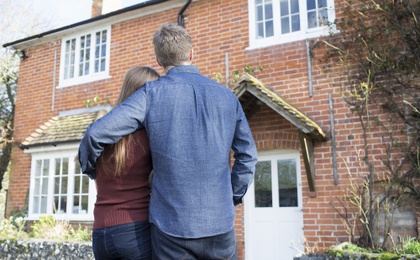The housing market changes each month, so it’s near impossible to state when the best time to buy is. However, there are factors that you should consider which could help your decision, so we’ll go through them here.
What affects home buying?
Before buying a home, you need to think about several key things:
- Current interest rates – How much you’re charged to borrow money for your home
- House price trends – Whether the market value of property is rising faster than usual
- How much stamp duty you'll pay – This is the tax paid when you purchase a property
- If any special mortgage schemes are available – The government offers assistance to certain buyers
💡 Tip: Talk to a mortgage adviser before making decisions. They can help you understand what's best for your specific situation.
What are mortgage interest rates?
Mortgage interest rates tell you how much extra money you pay when you borrow using a mortgage. Think of this rate as a fee the bank charges you for letting you use their money.
They are expressed in percentage form, so as an example, 4.2%. This means that you would pay an extra 4.2% each year on top of the money you borrowed.
Lower mortgage interest rates mean you pay less money to borrow. Rates can be either fixed (the cost to borrow is fixed for a specific timeframe) or variable (the cost to borrow can go up or down during the course of the loan).
Your credit score, deposit size and the economy, are a few things which can affect what mortgage rate you can get.
Current mortgage rates
Mortgage rates have risen since the record lows of 2021.
The Bank of England's base rate has dropped slightly in recent months and now stands at 4.5%, but it's still significantly higher than it was in 2021.This has pushed up mortgage interest rates considerably.
Over the last few months, mortgage rates have begun to fall, but no one knows how long this will last, and when they will begin to go up again.
As well as mortgage rates, you need to consider additional fees like booking and arrangement fees. Include these in your calculations to understand the true cost of your mortgage deal.
💡 Tip: If you add the cost of fees to your mortgage loan, you'll pay interest on them for years. It's often cheaper to pay fees upfront if you can.
Will house prices drop in 2025?
Nobody knows if and when house prices will drop. According to the latest figures, the average UK house price as of February 2025 was around £268,300. This represents a fall in house price inflation (the rate at which prices rise) of 1.8%.
Essentially, it tells us that despite property value going up, the speed at which it goes up has slowed down in recent months.
Spring remains the busiest home-moving season when most buyers and sellers enter the market.
Many property experts predict that house price growth will continue to slow slightly throughout 2025.
How to check the housing market
Use the UK House Price Index to understand how property prices have changed over the past 12 months. You can look at different property types and areas to spot trends.
Keep checking property websites like Rightmove and Zoopla for recently sold prices in your target area to track market changes.
Stamp Duty Land Tax explained
Stamp Duty Land Tax (SDLT) is a tax you pay when buying property or land over a certain price in England and Northern Ireland (the rules differ in Scotland).
The amount of stamp duty you pay depends on the purchase price of your property and whether you're a first-time buyer, home mover, or purchasing an additional property. It works as a tiered system where different tax rates apply to different portions of the property price.
As of April 2025, changes to Stamp Duty Land Tax (SDLT) has meant many buyers will now be either paying, or paying more, tax when they purchase a property.
The new rates are as follows:
|
Purchase price
|
SDLT rate
|
|
Up to £125,000
|
0%
|
|
The next £125,000 (the portion from £125,001 to £250,000)
|
2%
|
|
The next £675,000 (the portion from £250,001 to £925,000)
|
5%
|
|
The next £575,000 (the portion from £925,001 to £1.5 million)
|
10%
|
|
The remaining amount (the portion above £1.5 million)
|
12%
|
You pay no stamp duty on homes worth £125,000 or less. You only pay tax on the amount above this figure.
Example: If you buy a £300,000 house:
- You pay 0% on the first £125,000 = £0
- You pay 2% on the next £125,000 = £2,500
- You pay 5% on the remaining £50,000 = £2,500
- Your total stamp duty bill = £5,000
You can use an online stamp duty calculator to work out your exact payment.
First-time buyer? You get special benefits!
If you're buying your first home in England, Wales, or Northern Ireland, you get special treatment! You pay no stamp duty on the initial £300,000 of your home providing the property’s value is less than £500,000 and it’s your main home. For more information on SDLT exemptions, you can visit the government’s website.
Note: You must pay your stamp duty within 14 days after completing your house purchase. Your solicitor will help you with this.
Government mortgage schemes
The UK government offers several helpful schemes to make buying a home easier for you. These government mortgage schemes give first-time buyers and families a boost onto the property ladder. Some of these include:
- Help to Buy: You only need a small deposit because the government lends you part of your home's cost.
- Shared ownership: Lets you buy just a piece of a home and pay rent on the rest, making monthly payments more affordable.
- The mortgage guarantee scheme: Helps lenders feel safer giving mortgages to people with smaller deposits.
- First Homes: Offers discounted properties to local first-time buyers and key workers.
These government housing schemes create pathways to homeownership that might otherwise feel impossible. If you dream of owning your own home, exploring these UK government mortgage programs could turn that dream into reality much sooner than you think!
When should you buy a house?
As always, the right time will be dependent on you and your circumstances. If you do plan to buy, some final points to think about:
- Your personal life matters too: Avoid buying during other stressful times like around weddings or when having a baby.
- Lenders like financial stability: Try not to buy when you've just changed jobs or if your credit score needs work.
- Try to get as large a deposit as possible: This will help you access better mortgage deals.
Zubin is a personal finance writer with an extensive background in the finance sector, working across management and operational roles. He applies his experience in customer communication to his writing, with the aim of simplifying content to help people better understand their finances.










